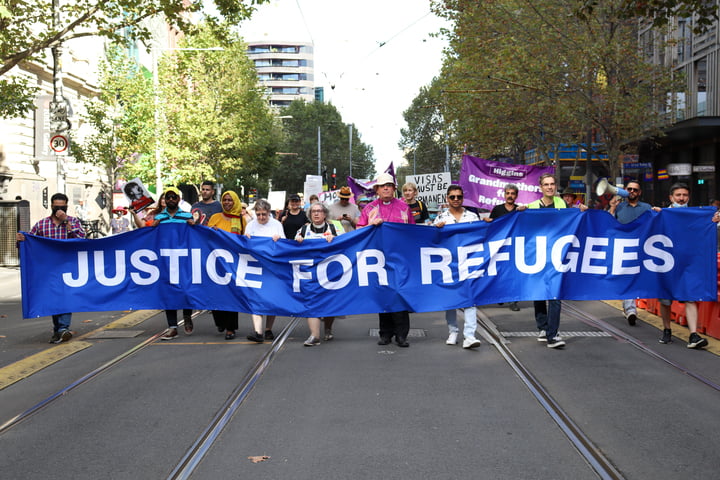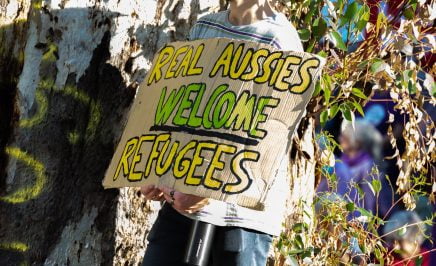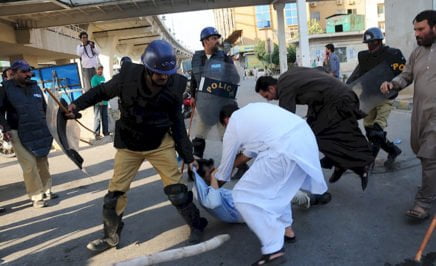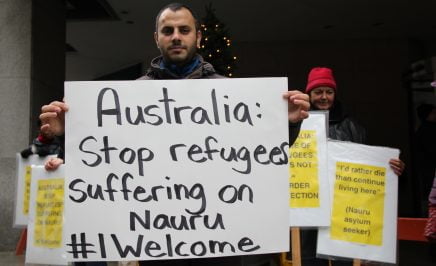On 8 November, the High Court of Australia ruled that it is illegal to indefinitely detain people on immigration grounds. The ruling overturned a precedent set in 2004 that the Australian government had used to justify its widely-criticised use of indefinite immigration detention for two decades.
Sadly, what should have been celebrated as a victory for basic principles of justice, human rights and common decency has instead been used to weaponise fear. It’s seen a knee-jerk response from the government, which has introduced further draconian legislation to demonise and punish people in a way no other like-minded democracy does.
It’s important to understand both the fundamental legal principles (both international and domestic) at play here, as well as who will be impacted by the High Court decision and the new laws introduced in response.
What changed on 8 November?
In November the High Court ruled in favour of a stateless Rohingya man who had been facing the possibility of lifelong detention. The man – known only as NZYQ – had been convicted for sex with a minor, causing the government to cancel his visa.
With no other country agreeing to settle him, under existing laws, he could be kept in immigration detention for the rest of his life.
The man’s lawyers argued that detaining him without the realistic prospect of deporting him to another country was unlawful, as it amounted to a punishment, something only the courts, not the government, was entitled to impose. The court ruled in the man’s favour, and found that the previous interpretation of the Migration Act, which had allowed indefinite detention, was unlawful.
What was the law previously?
Australia is party to the International Covenant on Civil and Political Rights (ICCPR) which states under Article 9: “Everyone has the right to liberty and security of person. No one shall be subjected to arbitrary arrest or detention.”
To understand how Australia arrived at the use of indefinite detention for immigration purposes, we have to go back to the early 1990s. Paul Keating’s Labor government introduced laws to mandatorily detain anyone without a visa. This applied to anyone entering the country “unauthorised”, such as people who came to Australia by boat seeking asylum. It also applied to people who’d had their visas cancelled for any other reason, such as on character grounds.
These people were automatically placed in immigration detention. The only way out was to be granted an Australian visa or to be returned to their home country. If neither of those things happened, someone without a visa could theoretically be kept in detention for life.
In 2004, a Palestinian man named Al-Kateb challenged the government’s right to detain him indefinitely. Despite the widely-accepted legal principle of habeas corpus – that a person must be released unless lawful grounds are shown for detaining them – the judges ruled against him. This case took the nightmare scenario of indefinite detention from a theoretical loophole to a regularly-cited legal precedent.
Al-Kateb’s case set the precedent for the next 20 years of Australia’s draconian immigration policy. And it held, right up until November this year, when the court ruled that it was unconstitutional for the government to detain anyone indefinitely.
Why did the court change its mind?
The Court has just released its full findings, whereby they reaffirmed that the basic principles of the constitution, which underpin the rule of law in this country, should apply.
This includes what’s commonly known as the separation of powers, whereby the executive (the government) makes the laws, and the judiciary (the courts) enforce the laws. Simply, it’s up to courts to impose “punishments” for those found guilty of committing crimes; governments cannot.
The ongoing indefinite detention of people who’ve served their time, and where the government clearly has no prospect of removing them, was seen by the High Court as an additional “punishment” and hence unconstitutional.
Who is facing indefinite detention?
There are various groups currently in immigration detention facilities. The largest group is people who’ve had their visa cancelled on character grounds. Non-citizens can have their visas cancelled for a number of reasons. However, if you commit an offence with a sentence of over 12 months, your visa is automatically cancelled.
While this includes a small number of people who’ve committed serious offences, the vast majority haven’t. And yet they are also caught up in the sledgehammer response from the federal government.
Other groups are also impacted, including those who may have adverse security (ASIO) findings against them. These people have never been found guilty of a crime and have no way of challenging the often secret findings against them. It also includes stateless people and those who cannot establish their identity. They too are detained without ever being charged, let alone found guilty of a crime.
Why can’t they be returned?
While the majority of those who have their visas cancelled are returned, a small number cannot. There are two main groups who cannot be removed.
The first are stateless individuals where no country accepts them as citizens, so there’s no country to return them to. The second are those where Australia has international obligations (known as non-refoulement obligations), where they can’t return someone to a country where that person would face serious persecution, including torture or death. Often this group includes former refugees, such as Afghans who fled the Taliban, as it has been accepted they would be killed if returned.
What are the new control orders?
The court ruling means that 92 people being held in detention would have to be released immediately, and the same could soon be true for another 340. Without any legal grounds to detain these people further, the government proposed a number of punitive ‘control orders,’ including electronic ankle bracelets and strict curfews.
Home Affairs Minister, Clare O’Neil, explained the control orders like this: “For the people who are released from detention … we have a simple message for them: We will set the strictest possible conditions for you. If you do not follow them, you will end up back in jail.”
Why are the control orders problematic?
These control measures are usually reserved as an alternative to prison, not for someone who has completed their sentence or has never been convicted of anything at all. Further, they are usually ordered by the courts, not the executive. No doubt, further High Court challenges await.
A number of those recently released following the High Court decision had already been placed in the community under community detention arrangements, as the decision had been made that they don’t pose a risk to anyone. Sadly they will now be forced out of their homes and onto visas that require them to be electronically tagged for the rest of their lives.
But haven’t some detainees committed crimes?
Even for those previously facing indefinite detention who have committed crimes, it’s important to remember that every year in Australia tens of thousands of former prisoners are released from prisons once they’ve served their time. Some have various reporting and other mechanisms put in place. But by and large, they’re now free to get on with their lives
It would be unconstitutional for governments (the executive) to step outside this system to enforce additional punishments on these people. But that’s exactly what’s been happening for years to non-citizens whose visas were cancelled and were held in detention, even when it was clear they could not be removed.
We are setting them up to fail
The 8 November High Court decision should have been an opportunity for the government to undertake a broader review of Australia’s detention regime, bringing it into line with Australia’s human rights obligations. Instead the knee jerk legislation that followed, responding to an orchestrated campaign built on fear and hysteria, will see those released subjected to draconian control measures.
These people, many of whom are deeply traumatised by years in detention, deserve the chance to re-enter the community and finally begin their lives. Instead, the government is looking for any pretence to put them back behind bars as soon as possible. It’s setting them up to fail.
We have a chance to finally do the right thing by these people
The Australian government needs to step back from the hysteria and calmly, rationally, look at how all other democratic countries deal with this situation. Carefully balancing issues of community safety with personal liberty, without resorting to measures that breach human rights or undermine the basic principles on which our democracy is built.
Hopefully there’s still opportunity for common sense to prevail.




